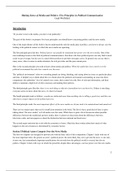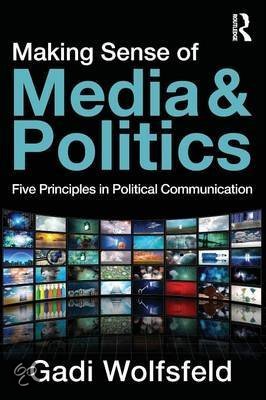Making Sense of Media and Politics: Five Principles in Political Communication
Gadi Wolfsfeld
Introduction
“If you don’t exist in the media, you don’t exist politically.”
The goal of this book is to propose five basic principles you should know concerning politics and the news media.
One of the major themes of this book is that to understand the role the media play in politics, you have to always start by
looking at the political context in which the news media are operating.
The first principle goes like this: Political power can usually be translated into power over the news media. One of the
most enduring lessons in the field of political communication is that those who have political power not only find it much
easier to get coverage, but also are in a much better position to get their messages across. In general one can say that in
many areas, when it comes to media attention, the rich get richer and the poor remain poor.
Here is the second principle you need to know about media and politics: When the authorities lose control over the
political environment they also lose control over the news.
The ‘political environment’ refers to everything people are doing, thinking, and saying about an issue at a particular place
and time. A helpful way to think about this is to break down the political environment surrounding an issue into three
components: the authorities’ level of control over events, their control over the flow of relevant information, and their
ability to maintain a high level of elite consensus surrounding their policies.
The third principle goes like this: there is no such thing as objective journalism (nor can there be). If there is one thing
everyone seems to know about the news, it’s that it is biased.
The fourth principle reads as follows: e media are dedicated more than anything else to telling a good story and this can
often have a major impact on the political process.
The final principle reads: the most important effects of the news media on citizens tend to be unintentional and unnoticed.
There are two major topics that receive insufficient attention in the book. The first is that a good deal of time is spent
talking about “the news media” as if all media were the same. While there is quite a bit of discussion about possible
differences between the traditional and new media, there is almost no discussion about the differences between
television, radio, and newspapers or about the distinction between national and local news.
The second major omission has to do with the economics of news. Much has been written about how much of what
happens in the news business is determined by economic factors
Section I Political Actors Compete Over the News Media
The first two chapters are designed to provide you with the basic rules of this competition. Chapter 1 deals with one of
the most important rules: the greater an actor’s political power, the more likely they are to get into the news. is one rule,
it turns out, has tremendously important ramifications for not only how the political world is covered, but also on
politics. Chapter 2 deals with ways in which the powerful, despite these advantages, can lose power over the new media.
1
,1 Political Power and Power Over the Media
A good rule of thumb is that journalists run after the politically powerful and politically weak run after journalists. is
brings us to the first of the five principles. Political power can usually be translated into power over the news media.
One reason journalists consider the powerful more newsworthy is that these are the people who are most likely to have an
impact on the country and the world.
Here’s another way to think of this idea. e relationship between journalists and political leaders can be considered a
competitive symbiosis. It is a symbiotic relationship because each depends on the other in order to achieve their goals.
Leaders want publicity and the journalists want interesting information they can turn into news. e reason the relationship
is also competitive is that each wants to get the most from the other while “paying” as little as possible.
The fact that political power can be translated into power over the news media does not mean that the weaker political
actors never get into the news. e news media have a preference for conflicts that is just as important as their preference
for power. ere is also an expectation that journalists will attempt to maintain a certain balance in news coverage. is means
that even if they give a great deal of coverage to a presidential speech they will then allow the opposition to respond.
One of the most important rules of international news is that there is always a good of information that flows from the
haves to the havenots and a mere trickle that runs in the opposite direction.
Does the fact that powerful elites get covered more mean that they get covered more positively? e answer, for the most
part, is yes. ere are basically two doors for getting into the news. the front door is reserved for VIPs: the people with
political power. When these people enter, they are usually treated with respect. They are covered because of who they are
as much as for what they are doing or saying.
The other way to get into the news is through the back door. is door is reserved for weaker political actors who only
become newsworthy if they do something especially weird or deviant. e powerful can be pretty boring and still get into
the news. But if you are not important you better be interesting.
In many conflicts the weaker side (let’s call them the challenger) is attempting to talk about some type of injustice while
the more powerful side wants to stress the need for law and order.
Is there a Side Door?
There is one strategy that weaker groups can sometime use to provide news people with drama without completely
sacrificing legitimacy: civil disobedience. The relative success of such tactics depends on three factors: the level of
violence that the authorities use against the group, the extent to which people can identify with your cause, and the level
of violence you use.
Cumulative Inequality
Another ramification of our first principle is the idea of cumulative inequality. Not only does political power translate to
power over the media, but the political actors who most need access to the news are the ones that find it the most di cult
to obtain. As in many areas of life, when it comes to exposure in the news media, the rich generally get richer and the
poor remain poor. Those with real political power certainly enjoy getting good publicity (who doesn’t?) and it also helps
them achieve their political goals. But because they have power, they are less dependent on the news media than others;
they can get things done directly (say by passing a law or sending troops somewhere). The powerless, on the other hand,
have little chance of achieving anything without some public attention.
2
, What About the New Media?
The new technology does make a difference, sometimes even a huge difference. But in addition to the new opportunities
that have become available because of the new media, there are also some important limitations. e new advantages and
the limitations of this new technology can be understood by looking at the type of challenger that could most benefit
from these changes: political movements.
Political Movements and the New Media
There are four major goals political movements attempt to achieve where the new Internet media could be useful. The
first, and most obvious, is that it should help movements in their efforts to mobilize supporters to their cause. e second
goal is to have their messages and news stories appear in the traditional media which will allow them to reach a much
wider audience. Related to that amplification effect, the third goal is to have an influence on public opinion so the wider
audience becomes more sympathetic with the movement. And ultimately, the fourth is to have an impact on politics.
These four goals can be seen as four stations that movements have to pass in their attempts to climb an extremely steep
mountain whose peak is called political success. It turns out that not only does it become increasingly difficult to pass
each station, but one finds that the new technology becomes less and less helpful as one gets closer to the top.
The major thing to remember is that all of this revolutionary technology provides movements with the potential to
exponentially increase their membership and resources. Whether it actually does depends, among many other things, on
how much the movement’s messages and leaders resonate with a large segment of the public.
So in some ways the new media have radically changed the relationship between political and media power. But due to
the rules of political competition, these cases remain the exception rather than the rule. When it comes to the ability of
movements and other challengers to organize and mobilize it is certainly a new age. On the other hand, the new
technologies appears to be less revolutionary when it comes to getting a message to the broad public or bringing about
real change. Equally important, the ability of political actors to successfully exploit the new media depends first and
foremost on who they represent, their goals, and the political environment in which they are operating. e powerful, it
turns out, still have the upper hand.
2 Political Control and Media Independence
The point to remember is that although political power always provides advantages, the news media sometimes go from
being lap dogs to attack dogs. The second principle explains when this happens: When the authorities lose control over
the political environment, they also lose control over the news.
The best way to understand the notion of a leaders’ political control is to look at three major indicators of success. The
first is the extent to which they are able to take control over important events. The second factor is the ability of the
authorities to take control over the flow of information. In the digital age it has become increasingly di cult for even the
most ruthless dictators to completely control the flow of information. Nevertheless, there are some types of events—such
as secret negotiations—where the president and other leaders find it easier to control the flow of information. is this why
leaks are so good for journalists and so bad for leaders. Leaks are especially problematic for the authorities because they
are often designed to embarrass those in charge. The third factor that tells us something important about the control over
the political environment may be the most important: how much are leaders able to mobilize a broad consensus in
support of their policies, especially among the political elite.
Political Control and Media Independence
What do we mean when we talk about the “an independent media”? To answer that question you should think about three
3





